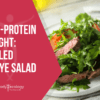No Jet Lag, No Problem: Avoid These 3 Things When Flying
If you plan on crossing a few time zones over the holidays, you’ll want to prepare.
What Jet Lag Looks Like
Eating junk food while traveling can throw your inner ecosystem out of whack. Complete gut support with the Body Ecology Quick Start Program can minimize the effects of jet lag after a long flight.
Everyone’s circadian clock is set to roughly 24 hours. As your body adjusts to a new time zone, you may:
- Have difficulty sleeping
- Feel very tired during the day
- Feel unwell and unable to perform
- Have gastrointestinal troubles1
Jet lag may not seem like a big deal. But the reality is that your body wasn’t designed to move quickly over long distances. When this happens, your internal clock is thrown for a loop.
Your metabolism shifts, your behavior changes, and your immune system crashes. This is because your circadian rhythm is synced up to large environmental cues. Like sunlight. And when you eat.
How to Avoid Jet Lag in 3 Steps
In order to minimize the effects of jet lag and give yourself the support you need while traveling, follow these three tips:
1. Avoid screens (or wear orange-tinted glasses).
That sleepy feeling that you get at the end of the day is partly caused by a hormone called melatonin. Your body releases melatonin at night, while you sleep. Light controls the release of melatonin. The short-wave blue light coming from electronic devices like flat-screen televisions, smartphones, tablets, and laptops can suppress melatonin and interfere with your sleep.2
Because children have larger pupils than adults, they are more sensitive to short-wave blue light.3 One recent study found that twice as much melatonin is suppressed in children than in adults when exposed to the same amount of light.4
When flying, you can ease into a new time zone by avoiding screens during the midnight and early morning hours.
You may also want to invest in a pair of orange-tinted glasses. Research shows that these glasses can effectively filter out short-wave blue light.5
2. Avoid junk food.
Maybe you’re on vacation. But your body isn’t.
It turns out that a distorted circadian rhythm (or jet lag) triggers leaky gut.6 This is partly because your gut bacteria have a 24-hour rhythm that’s linked up to your own sleep-wake cycle.7 During the daylight hours, your gut bacteria are in “maintenance” mode — moving food through the small intestine and helping to detoxify the body. During the evening hours, they are in “repair” mode as different communities of bacteria consume food, repair DNA, and grow.
But aren’t the inside of your intestines dark all of the time? One way that gut bacteria sense day and night is through your own biochemistry. When you’re jet-lagged, your inner ecosystem is thrown out of balance. Maintenance and repair don’t happen. Instead, the wrong bacteria take over.
For example, samples of gut bacteria that were pulled during jet lag showed a higher proportion of Firmicutes, a family of bacteria that is associated with obesity and metabolic disease.8
When traveling, the principles of The Body Ecology Diet are more important than ever. A gut-healing diet curtails the damage that jet lag does to your inner ecosystem.
3. Avoid coffee.
Coffee and other stimulants with caffeine may sound tempting. After all, they’ll give you the boost that you need to make your flight or bounce off the plane.
But the problem with caffeine is that it can push your circadian clock in the wrong direction.
If you use caffeine when you would normally allow yourself sleep, you may later find it difficult to go to sleep or stay asleep. This means that you may be exposed to more light than you want — further pushing your circadian rhythm out of balance. Likewise, over-the-counter melatonin (which supports sleep) is only useful when taken at the right time.
Melatonin taken during the early evening advances your internal clock (appropriate if you’re flying east), whereas melatonin taken during the morning delays it (appropriate if you’re flying west). There is also a “dead zone” when melatonin isn’t useful. This is right before bedtime, when melatonin levels naturally rise.9
What To Remember Most About This Article:
Jet lag is the most unpleasant part of holiday travel. It can wipe out your vacation before you have time to recover. The truth is that your body was not designed to move quickly over long distances. Air travel can easily throw off your internal clock.
You can minimize jet lag by supporting your body with three helpful tips:
- Stay away from screens. Flat-screen TVs, smartphones, tablets, and laptops release short-wave blue light that suppresses melatonin and interferes with sleep. Avoid screens during the midnight and early morning hours to better adjust to a new time zone.
- Skip the junk food. A disrupted circadian rhythm caused by jet lag can trigger leaky gut. Your gut bacteria are also on a 24-hour cycle. Follow a gut-healing diet when traveling to prevent damage to your inner ecosystem.
- Don’t rely on coffee. Caffeine can further push your circadian clock out of whack, especially if you use it to stay awake when you would normally be asleep. If you drink too much coffee when hopping time zones, you may find it hard to go to sleep or stay asleep at night.
- [product id=”170″]
REFERENCES:
- Campbell, S. S., Eastman, C. I., Terman, M., Lewy, A. J., Boulos, Z., & Dijk, D. J. (1995). Light treatment for sleep disorders: consensus report I. Chronology of seminal studies in humans. Journal of biological rhythms, 10(2), 105-109.
- Wood, B., Rea, M. S., Plitnick, B., & Figueiro, M. G. (2013). Light level and duration of exposure determine the impact of self-luminous tablets on melatonin suppression. Applied ergonomics, 44(2), 237-240.
- Higuchi, S., Nagafuchi, Y., Lee, S. I., & Harada, T. (2014). Influence of Light at Night on Melatonin Suppression in Children. The Journal of Clinical Endocrinology & Metabolism.
- Winn, B., Whitaker, D., Elliott, D. B., & Phillips, N. J. (1994). Factors affecting light-adapted pupil size in normal human subjects. Investigative Ophthalmology & Visual Science, 35(3), 1132-1137.
- Rea, M. S., Figueiro, M. G., Bierman, A., & Hamner, R. (2011). Modeling the spectral sensitivity of the human circadian system. Lighting Research and Technology, 1477153511430474.
- Foerst, J. J. (2013). Night Shift Belly.
- Mukherji, A., Kobiita, A., Ye, T., & Chambon, P. (2013). Homeostasis in intestinal epithelium is orchestrated by the circadian clock and microbiota cues transduced by TLRs. Cell, 153(4), 812-827.
- Thaiss, C. A., Zeevi, D., Levy, M., Zilberman-Schapira, G., Suez, J., Tengeler, A. C., … & Elinav, E. (2014). Transkingdom control of microbiota diurnal oscillations promotes metabolic homeostasis. Cell.
- Waterhouse, J., Reilly, T., Atkinson, G., & Edwards, B. (2007). Jet lag: trends and coping strategies. The Lancet, 369(9567), 1117-1129.









